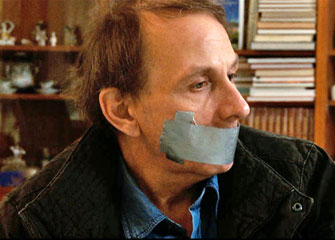
In September 2011, the (real-life, controversial) French novelist Michel Houellebecq disappeared for some time during a promotional tour for his novel La Carte et le Territoire, giving rise to speculation on the Web as to what had happened to him – some suggested on Twitter that he’d been kidnapped. Now director Guillaume Nicloux has made a film, L’Enlèvement de Michel Houellebecq, that purportedly reveals to the public what happened.
The film supposes that Houellebecq really was kidnapped by a trio consisting of an obese bodyguard, a poetry-loving bodybuilder and an ex-cage fighter. Together they spend a long, indeterminate stretch of time in the home of the bodybuilder’s parents smoking, eating, talking, drinking, sleeping, playing cards, getting bored, reading, arguing, eating, smoking, drinking, sleeping. One day, someone (we never find out who) pays Houellebecq’s ransom, and then they all go their separate ways.
In an interview, Nicloux said that he wanted to “blur the boundary between fact and fiction.” None of the actors in the film are professional; they’re all “playing themselves.” The movie was produced by placing four cameras in the room of a given scene, giving the characters such basic (often arbitrary) improvisational cues as “Michel mentions Poland,” and providing sufficient alcohol, food and cigarettes. The players took it from there.
Houellebecq cuts a fragile, nihilistic figure. He’s constantly chain-smoking, drinking or eating. He doesn’t care what people think about what he says. When he is kidnapped, he seems utterly unfazed. Nicloux explains this nonchalance as Houellebecq’s being “already dead”; he’s slowly “committing suicide,” but, in true nihilistic fashion, he doesn’t seem to care whether he lives or dies.
The film emphasizes the characters’ dependence on (and almost identification with) their bodily needs, giving rise to farcical, repetitious exchanges in which, for example, Houellebecq insistently yet half-heartedly guilt-trips Luc for having lent him his cigarette lighter only to take it away from him again later. Conversations are slowed and prolonged by alcohol, and then everyone goes to sleep.
The relations of mutual dependency and power depicted in the film are embedded in a gray day-to-day routine that’s neither depressing nor exciting. There is a discussion with a Polish man (who speaks only Polish) who lives in a container on site and helps the husband of the elderly couple tinker with his engines. Houellebecq asks Luc to bring back Spanish, not French, wine on his next trip to the supermarket. When asked about how to write a novel, Houellebecq advises, “First you need to get bored, then ideas come.” When it’s finally time for Houellebecq to leave, he’s reluctant and even suggests that he come back to spend the weekend in the vacant container next to that of the Polish man and bring his hostess the poem he has promised her.
Understandably, the film is, at times, boring. But who says that good art has to be entertaining all the time? The film is also funny, sad and odd; and these disparate moments have a mimetic function: life’s sometimes all of these things, and the film could plausibly be read as a microcosm of collective existence on any level. It reminded me at many points of Samuel Beckett’s Waiting for Godot; it has a similar property of potential generality – you could take these characters and make them placeholders for others occupying similar roles in distant contexts.
Favorite